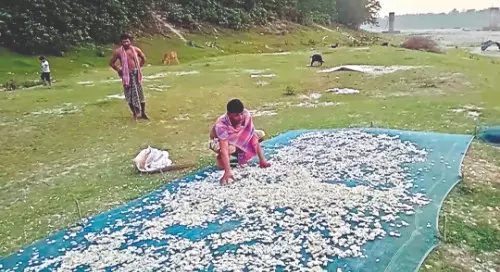Once considered as waste, discarded fish scales fuel new livelihood in Balurghat

BALURGHAT: A surprising yet sustainable transformation is underway on the banks of the Atreyee River in Balurghat, where discarded fish scales — once considered useless waste — are becoming a source of livelihood for local fishermen. These fish scales, often seen floating in drains or rotting in ponds, are now opening doors to a global market.
From food supplements and nail polish to decorative sequins, fish scales are being used as a raw material in various industries. Fishermen in Balurghat have tapped into this opportunity, collecting and drying scales from fish like rohu and katla. Neatly laid out along the riverside, these scales are left to dry under the sun before being transported in bulk to Kolkata, where they undergo further processing.
Entrepreneurs from Kolkata are buying the dried scales in large quantities — often by the quintal — and sending them overseas after refining. The scales are ground into powder, polished and mixed with other materials to create products for international markets. This innovative approach to waste management is setting an example of how traditional livelihoods can evolve sustainably, bringing hope to many small-scale workers in the region. On Wednesday, local fisherman Uttam Sarkar was seen carefully drying fish scales along the Atreyee River. “This has become an alternative source of employment for us. It’s a new path to income,” he said. Currently, at least five fishermen in the area are actively involved in this trade, which not only boosts their earnings but also helps maintain cleanliness in local fish markets.
When around 10 quintals of dried scales are ready, entrepreneurs arrive with trucks to transport the material to Kolkata. There, the scales are processed and shipped overseas, where they are transformed into valuable consumer products. Each quintal sells for approximately Rs 4,000, with the price sometimes going even higher depending on demand.
“This initiative is benefiting both the environment and our economy,” said fisherman Shyamsundar Sarkar. “Our fish markets are cleaner, and we are earning more.”



